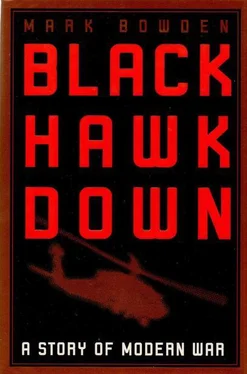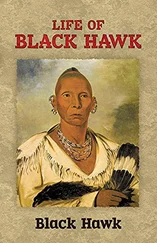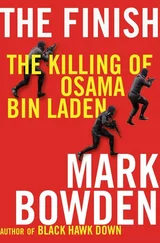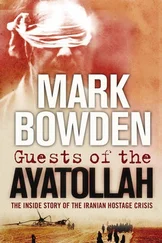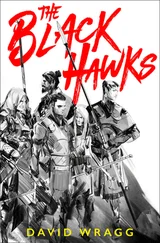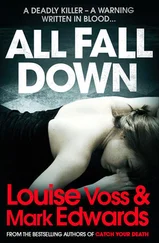Mark Bowden - Black Hawk Down
Здесь есть возможность читать онлайн «Mark Bowden - Black Hawk Down» весь текст электронной книги совершенно бесплатно (целиком полную версию без сокращений). В некоторых случаях можно слушать аудио, скачать через торрент в формате fb2 и присутствует краткое содержание. Город: New York, Год выпуска: 1999, ISBN: 1999, Издательство: Atlantic Monthly Press, Жанр: nonf_military, на английском языке. Описание произведения, (предисловие) а так же отзывы посетителей доступны на портале библиотеки ЛибКат.
- Название:Black Hawk Down
- Автор:
- Издательство:Atlantic Monthly Press
- Жанр:
- Год:1999
- Город:New York
- ISBN:978-0871137388
- Рейтинг книги:3 / 5. Голосов: 1
-
Избранное:Добавить в избранное
- Отзывы:
-
Ваша оценка:
- 60
- 1
- 2
- 3
- 4
- 5
Black Hawk Down: краткое содержание, описание и аннотация
Предлагаем к чтению аннотацию, описание, краткое содержание или предисловие (зависит от того, что написал сам автор книги «Black Hawk Down»). Если вы не нашли необходимую информацию о книге — напишите в комментариях, мы постараемся отыскать её.
Black Hawk Down — читать онлайн бесплатно полную книгу (весь текст) целиком
Ниже представлен текст книги, разбитый по страницам. Система сохранения места последней прочитанной страницы, позволяет с удобством читать онлайн бесплатно книгу «Black Hawk Down», без необходимости каждый раз заново искать на чём Вы остановились. Поставьте закладку, и сможете в любой момент перейти на страницу, на которой закончили чтение.
Интервал:
Закладка:
“Where’s this guy shooting from, man?”
Stebbins pointed out the window.
“All right, we’ve got it covered. Keep your heads down.”
From his window perch, the commando marksman let go a round from his M203 grenade launcher, dropping it right into the targeted window. There was an enormous blast. Stebbins figured the round had detonated some kind of ammo, because there was a flash throughout the first floor. Black smoke poured from the window.
The evening grew quiet. Stebbins saw lights flick on in the distance and was reminded that they were in the middle of a big city, and that in some parts of it life was proceeding normally. There were fires burning somewhere back toward the Olympic Hotel, where they had roped in. It seemed like ages ago.
A voice shouted across the intersection that everyone was to retreat back to the building across from the crash site. One by one, the men on Stebbins’ corner started sprinting across the intersection. The volume of fire had died down.
Stebbins heard a whistling sound, and he turned to see what looked like a rock hurtling straight at him. It was going to hit his head. He ducked and turned his helmet toward the missile, and he was engulfed in fire and light.
His eyes were closed, but he saw bright red when the grenade exploded. He felt searing flames. He smelled burned hair and dust and hot cordite, and he was tumbling, mixed up with Heard, until they both came to rest sitting upright and staring at each other.
“Are you OK?” Heard asked after a long moment.
“Yeah, but I don’t have my weapon.”
Stebbins started to crawl back to his position, looking for his weapon. He found it in pieces. There was a barrel but no hand grip. He could feel dust up his nose and in his eyes, and he could taste it. He tasted blood, too. He figured he’d just cut his lip.
He needed another weapon. He stood up and started running for the courtyard, figuring he’d grab a rifle from one of the wounded men. He kept falling down. His left leg and foot felt as if they were asleep. Some of the other men ran out and dragged him into the courtyard.
Stebbins was covered with dirt and dust, his pants burned off, his leg bleeding. Wilkinson helped him into the back room where the other wounded were gathered. It was already dark there, and Stebbins smelled blood and sweat and urine. There were three Somalis huddled on a couch; the the boys had handcuffed the man of the house and sat him down with his wife and child. Rodriguez was in the corner, moaning and taking short, loud, sucking breaths.
The Somalis moved to the floor, and Wilkinson eased Stebbins down on the couch and started cutting off his left boot with a big pair of shears.
“Hey, not my boots!” he complained. “What are you doing that for?”
Wilkinson slid the boot off smoothly and slowly and removed the sock. Stebbins was shocked to see a golf ball-sized chunk of metal lodged in his foot. He realized for the first time that he’d been hit. He had noticed that his trousers looked blackened, and now, illuminated by the medic’s white light, he saw that the blackened flaking patches along his leg were skin. He felt no pain, just numbness. The fire from the explosion had cauterized his wounds.
One of the boys poked his head in the door and gestured toward the white light.
“Hey, man, you’ve got to turn that white light out,” he said. “It’s dark out there now, and we’ve got to be tactful.”
Stebbins was amused by that word: Tactful. But then he thought about it—tactful, tact, tactics—and it made perfect sense.
Wilkinson turned off the white light and flicked on a red flashlight.
“You’re out of action,” he said. “Listen, you’re numb now, but it’s going to go away. All I can give you is some Percocet.”
Wilkinson handed Stebbins a tablet and some iodized water in a cup. Wilkinson then handed him a rifle. “You can guard this window,” he told him.
“OK.”
“But as your health-care professional,” Wilkinson added, “I feel I should warn you that narcotics and firearms don’t mix.”
Stebbins just shook his head and smiled.
Finally he was left to sit there alone on the couch, clutching his rifle, listening to Rodriguez moaning and sucking air and to the Somalian woman complaining with words he didn’t understand that her husband’s handcuffs were too tight. Stebbins realized he had to urinate badly. There was no place to go. So he just released the flow where he sat.
He caught the woman’s eye.
“Sorry about the couch,” he said.
CHAPTER 24
Disarray in Command, and Trapped
December 9, 1997
AS DARKNESS FELL, tensions continued to build between the Commando and Ranger commanders. Over the radio, they argued over where to best position the 99 men now scattered through the narrow streets around pilot Cliff Wolcott’s downed Blackhawk.
Capt. Scott Miller, the Commando ground commander, wanted Capt. Mike Steele, the Ranger commander, to take the nearly two dozen men holed up with him and move a block north to where Miller had taken cover with his men. Steele was reluctant.
Lt. Col. Gary Harrell, the mission commander, radioed from his Blackhawk helicopter circling high over the city. He agreed with Miller that everyone should be gathered in one place near the crash site to form more effective crossfire zones and give helicopter gunships a better shot at the Somalian gunmen surrounding them. The Little Birds were making dazzling gun runs, raining brass links from the miniguns on their heads.
I know it’s tough, said Harrell, and you’re doing the best you can, but try to get everyone at one site and have one guy talking down there if you can.
Steele responded: “OK. Hoo-ah.”
He told a sergeant, Sean Watson, to get ready to move out. Watson immediately confronted his captain. Many enlisted men would lack the confidence to challenge their commanding officer, especially in battle, but Watson was a highly respected sergeant first class. He spoke bluntly.
“Hey, sir, uh-uh,” he said. “No way.”
Watson said he thought the idea was foolhardy. They could expect a hail of bullets and grenades the second they stepped out the door. They had five wounded men, two of whom would have to be carried. The body of Commando Sgt. First Class Earl Fillmore, who had been shot in the head, would also have to be hauled. Four men would have to carry each litter, making convenient cluster targets. Watson pointed out that it would take a lot to overrun their well-defended courtyard.
The Rangers listened nervously. To a man, they sided with Watson. They thought moving only invited more trouble when they had plenty already. Steele took a deep breath and reconsidered.
“I think you’re right,” he told Watson.
Steele conferred briefly with the D-boys in the courtyard, then relayed word to Miller:
Right now we’re not going to be able to move, not with all these wounded.
Miller was perturbed. Technically, as he understood it, even though he and Steele were both captains, his D-boys were in charge on the ground. He wanted Steele and his men to move.
Steele did not consider Miller his superior officer. He relayed word to Miller, no, and suggested the question be settled by Col. Harrell. If Harrell said move, they’d move.
Harrell refused to decide the issue. He told both captains:
If you stay separated, I cannot support you as well. You’re the guy on the ground, and you have to make the call.
Steele had made his call. He was not going to waste time arguing about it. He ignored Sgt. John Boswell when the Commando soldier offered him his headset and urged him to discuss the matter further with Miller.
Miller then made his own call. He ordered the Commando soldiers pinned down with Steele’s men to move up and join him, leaving the Rangers behind. Steele was bitter, but he didn’t try to stop them.
Читать дальшеИнтервал:
Закладка:
Похожие книги на «Black Hawk Down»
Представляем Вашему вниманию похожие книги на «Black Hawk Down» списком для выбора. Мы отобрали схожую по названию и смыслу литературу в надежде предоставить читателям больше вариантов отыскать новые, интересные, ещё непрочитанные произведения.
Обсуждение, отзывы о книге «Black Hawk Down» и просто собственные мнения читателей. Оставьте ваши комментарии, напишите, что Вы думаете о произведении, его смысле или главных героях. Укажите что конкретно понравилось, а что нет, и почему Вы так считаете.
